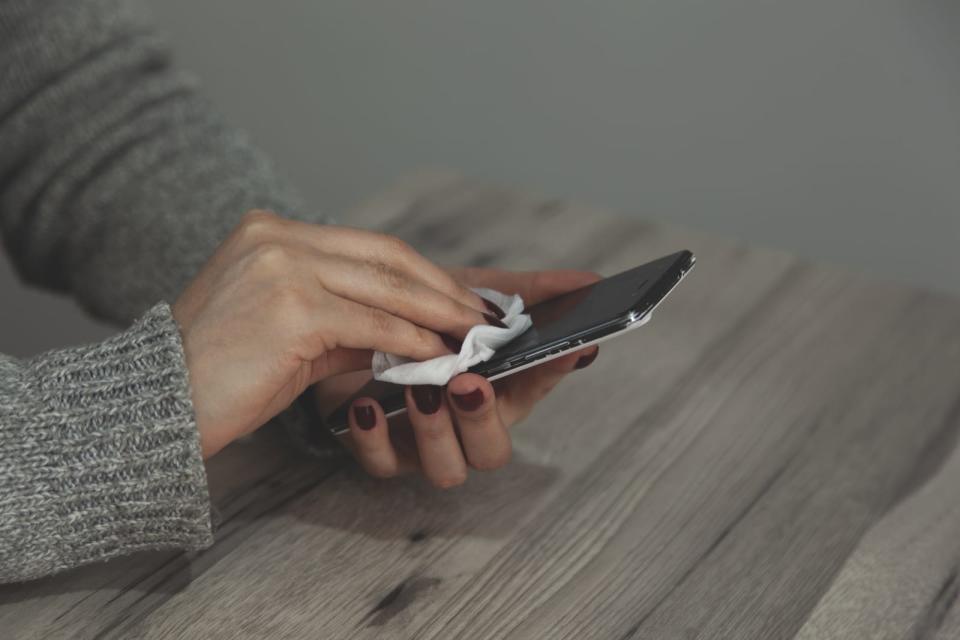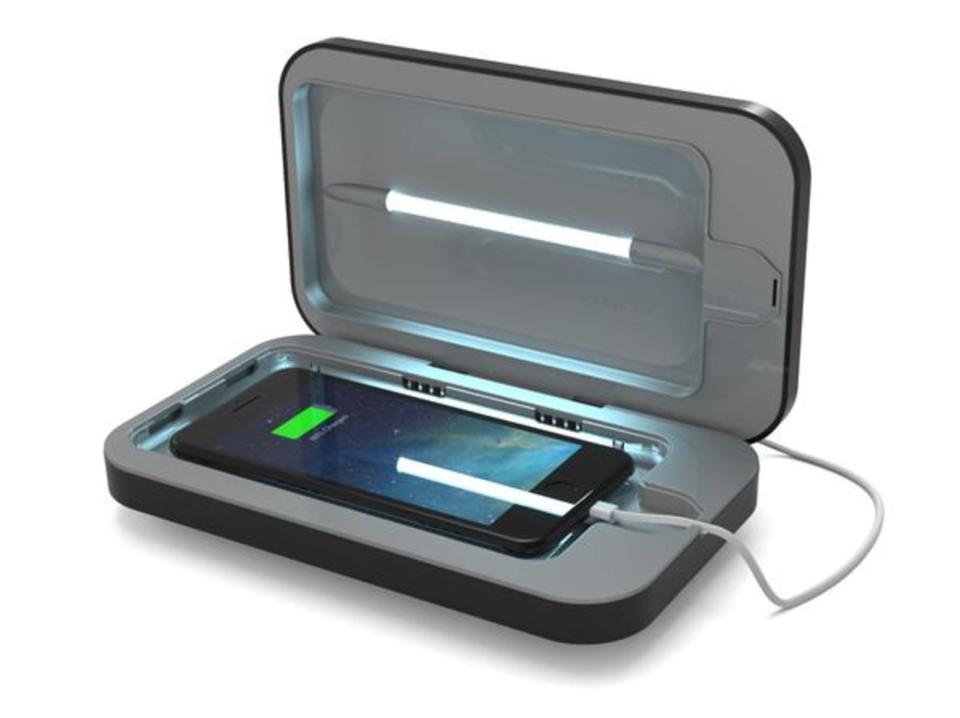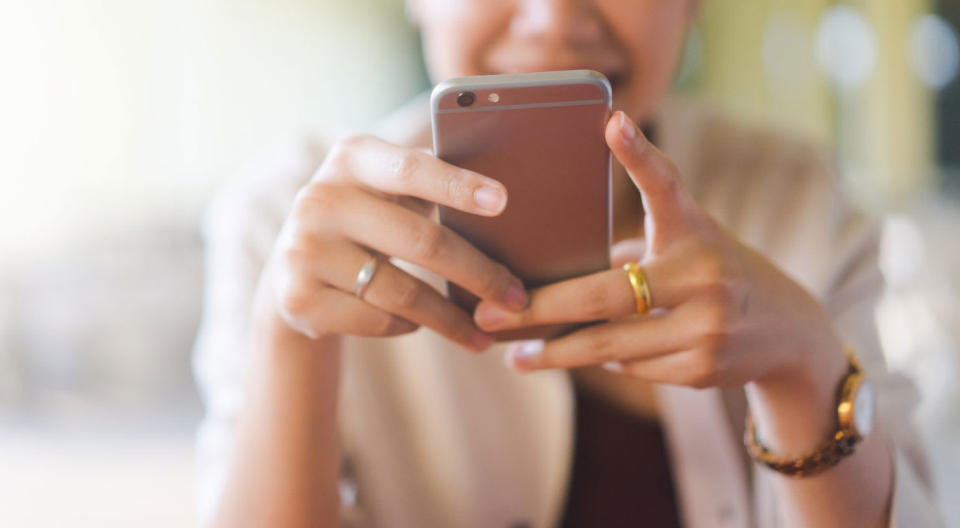Health experts explain how we should be cleaning our gadgets
It's more than going at it with a tissue.
The coronavirus has disrupted our lives in ways both large and small. Multiple organizations have cancelled conferences and events, and various municipalities have instructed residents to practice social distancing and to stay home whenever possible. If there was any kind of upside it's that we're all suddenly a lot more conscious of personal hygiene. Health authorities have advised the public to practice good sanitation practices, such as washing hands with soap, refraining from touching our face and coughing into our elbows. Another way to maintain good hygiene? Keeping our gadgets clean.
"Phones, laptops and other electronics travel with us everywhere, from bathrooms to buses to kitchens and restaurants," said Dr. Kelly A. Reynolds, an Associate Professor in the College of Public Health at the University of Arizona. She authored a study about hygienic preventions to prevent viral spread. "Like our hands, they pick up germs along the way. Frequently touched surfaces are vulnerable to increased contamination that can spread to hands, and then to entry points on the body where infection occurs, such as the eyes, nose and mouth."
According to the CDC, transmission of the COVID-19 virus from surfaces has not yet been documented -- it's much more common via respiratory droplets or direct human contact. But, the CDC suggests cleaning any surfaces down all the same, as the virus can last from hours to several days on some materials. A recent study showed that the COVID-19 virus in particular can last up to 24 hours on cardboard and two to three days on plastic and stainless steel. The CDC states that "cleaning of visibly dirty surfaces followed by disinfection is a best practice measure for prevention of COVID-19 and other viral respiratory illnesses in households and community settings."
"If you touch something contaminated, such as your phone, after hand washing, you need to wash it again to clear the virus away," said Dr. Jonathan Golob, an Assistant Professor of Infectious Diseases and Internal Medicine at the University of Michigan School of Medicine.
The consensus is clear: You need to be cleaning the gadgets that you use often. That includes your phone, and for some of you, your laptop or keyboard as well.

Be gone, germs
How best to clean your phone will differ from manufacturer to manufacturer, but there are a few general guidelines. Obviously, the first thing to do is to remove any protective case as well as unplug any cables. For general-purpose cleaning, nearly all manufacturers suggest gently wiping down the phone with a soft, lint-free cloth. Both Apple and Samsung suggest using a microfiber material or a camera lens cleaning cloth, for example. If your phone is a little grimier than normal, then you can use a dampened cloth to wipe the smudge away, being careful to avoid excess moisture getting into any open ports.
But simply wiping your phone down won't get rid of germs. To do so, you can use soap. "Coronavirus has a fat coating it needs to infect us," said Golob. "Soap and water or alcohol gels destroy this fatty layer, and thus make the virus unable to infect us." But, be sure to check the manufacturer's website to make sure soap is allowed. Apple, for example, suggests using a cloth dampened with warm, soapy water, but only with the iPhone 11 line of handsets (you can then "rinse" the soap off with another damp cloth, then dry it off with another one). Google recommends using ordinary household soap only on the back and sides of the Pixel. Samsung, on the other hand, doesn't recommend soap at all.
For an even easier way to sanitize your phone, you could use disinfecting wipes. We were once advised not to use alcohol wipes on our phones, as they could potentially remove the oleophobic coating that prevents fingerprint smudges. But recently, Apple released a statement that it's OK to use 70 percent isopropyl alcohol wipes or Clorox Disinfecting Wipes, as long as they don't have any bleach. Google and Samsung have similar recommendations as well. That said, all three companies strongly advise against pouring the alcohol solution directly onto the phone; use the cloths and wipes instead.
Cleaning your laptop is very similar to cleaning your phone; start with a dry lint-free cloth and move on to a slightly dampened cloth for wiping down the screen. For a deeper, sanitizing clean, manufacturers like Apple and Lenovo have recommended using the aforementioned disinfectant wipes for both the display and the keyboard. If it's an external keyboard, you can also use compressed air to clear away any dust particles, though that won't kill any germs.

An alternate option is to buy a UV sanitizer like PhoneSoap, which uses UV-C light to "clean" your phone in just ten minutes. "UV-C light is effective against a wide range of germs and provides an option for disinfecting your phone without the use of chemicals," said Reynolds. While that might be true, it's unclear if this has been tested with the COVID-19 virus. Additionally, these UV sanitizers tend to be very expensive, and don't seem to be any more effective than simply using the wipes.
As for how frequently you should clean your devices, well, that depends. "You may want to disinfect your phone after using it in the bathroom, or before using it at the dining room table," said Reynolds. "Developing a habit of daily disinfection will help to keep the germ count low."
Golob generally agrees. "A good rule of thumb is to clean the device and then your hands—particularly before eating or touching your face."
Don't do this:
Even though some of these warnings were alluded to above, they bear repeating:
Avoid getting moisture into any openings or ports
Avoid window cleaners, household cleaners, aerosol sprays, solvents, ammonia, abrasives, or cleaners containing hydrogen peroxide.
Avoid bleach especially
Avoid abrasive cloths and materials, such as paper towels
Avoid submerging the products in cleaning solution
Avoid excessive wiping that might damage the product
In general, be sure to check the manufacturer's website before cleaning your device so you don't ruin it.
Keeping it clean
Aside from keeping your phone and laptop clean according to the above instructions, there are a few extra steps you can take to ensure proper gadget hygiene. "Another way to keep your phone clean is to keep your hands clean before use and avoid sharing your electronics with others," said Reynolds. "Avoiding contact with your face, from either your hands or your device, is another approach to breaking the cycle of germ transmission."
What could prove harder to do, however, is to simply not touch it as much. Experts suggest not using it while eating, and not while on the toilet. "Treat your gadgets as another hand," Golob said. "They can get contaminated with coronavirus, spread it to you and others, and make you sick."


